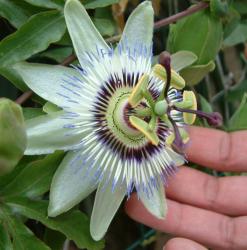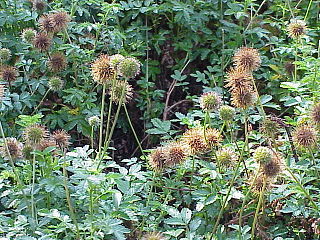
The Passifloraceae are a family of flowering plants, containing about 750 species classified in around 27 genera.

Anthericum is a genus of about 65 species, rhizomatous perennial plants in the family Asparagaceae, subfamily Agavoideae. It was formerly placed in its own family, Anthericaceae. The species have rhizomatous or tuberous roots, long narrow leaves and branched stems carrying starry white flowers. The members of this genus occur mainly in the tropics and southern Africa and Madagascar, but are also represented in Europe.

Acaena is a genus of about 60 species of mainly evergreen, creeping herbaceous perennial plants and subshrubs in the family Rosaceae, native mainly to the Southern Hemisphere, notably New Zealand, Australia and South America, but with a few species extending into the Northern Hemisphere, north to Hawaii and California.

Rauvolfia is a genus of evergreen trees and shrubs, commonly known as devil peppers, in the family Apocynaceae. The genus is named to honor Leonhard Rauwolf. The genus can mainly be found in tropical regions of Africa, Asia, Latin America, and various oceanic islands.

The Polemoniaceae are a family of flowering plants consisting of about 27 genera with 270–400 species of annuals and perennials native to the Northern Hemisphere and South America, with the center of diversity in western North America.

Calceolaria, also called lady's purse, slipper flower and pocketbook flower, or slipperwort, is a genus of plants in the family Calceolariaceae, sometimes classified in Scrophulariaceae by some authors. This genus consists of about 388 species of shrubs, lianas and herbs, and the geographical range extends from Patagonia to central Mexico, with its distribution centre in Andean region. Calceolaria species have usually yellow or orange flowers, which can have red or purple spots. The Calceolaria Herbeohybrida group, also called C. herbeohybrida Voss, is a group of ornamental hybrids known only in cultivation, called florists' slipperwort.

Weinmannia is a genus of trees and shrubs in the family Cunoniaceae. It contains 90 species, which range from Mexico through Central and South America including the Caribbean, and to the Mascarene Islands in the western Indian Ocean. It is absent from mainland Africa and Australia, but some fossils have been attributed to Weinmannia in Australia.

Soliva is a genus of South American plants in the sunflower family. Burrweed is a common name for some species in this genus.

Hipólito Ruiz López, or Hipólito Ruiz, was a Spanish botanist known for researching the floras of Peru and Chile during an expedition under Carlos III from 1777 to 1788. During the reign of Carlos III, three major botanical expeditions were sent to the New World; Ruiz and José Antonio Pavón Jiménez were the botanists for the first of these expeditions, to Peru and Chile.

Bowlesia is a genus of flowering plant in the family Apiaceae. It includes 16 species native to the subtropical Americas, ranging from Oregon to Florida and southeastern Mexico in North America, and from Ecuador and southeastern Brazil to southern Argentina and southern Chile in South America.

Mutisia is a genus of flowering plant in the tribe Mutisieae within the family Asteraceae. Mutisia has been named after José Celestino Mutis. It comprises about sixty species which can be found along the entire length of the Andes and in southern Brazil, Paraguay, Uruguay and northern Argentina.

Guatteria is a genus of flowering plants in the family Annonaceae. It is the largest genus in the family in South America, and the dominant genus in mature forest. The fruits are berries, borne in clusters on short stalks.

Kageneckia is a genus of flowering plant in family Rosaceae.

José Antonio Pavón Jiménez or José Antonio Pavón was a Spanish botanist known for researching the flora of Peru and Chile.

Conanthera is a genus of small bulbous plants with small panicles of blue, purple or white and purple flowers. Propagation is by offsets or seed. All species are native to Chile, but there is an old 18th-Century report of C. bifolia occurring in colonial Peru as well. This could possibly be attributed to changes in boundaries between the two countries, as modern sources list the species as endemic to Chile.
- Conanthera bifoliaRuiz & Pav. - from Valparaíso to La Araucanía
- Conanthera campanulataLindl. - from Antofagasta to La Araucanía
- Conanthera parvula(Phil.) Muñoz-Schick - from Valparaíso to La Araucanía
- Conanthera trimaculata(D.Don) F.Meigen - central Chile
- Conanthera urceolataRavenna - Atacama

Clinanthus is a genus of bulbous plants in the family Amaryllidaceae. It is found in western South America, including Ecuador, Peru, Bolivia, north Chile and north west Argentina.

Clarisia is a genus of trees in the family Moraceae, native to North and South America, ranging from Mexico to Bolivia.

Annonoideae is a subfamily of plants in the family Annonaceae, with genera distributed in tropical areas world-wide. The family and this subfamily are based on the type genus Annona.
Ruizodendron is a monotypic genus of flowering plants belonging to the family Annonaceae. It is part of Malmeoideae subfamily and Malmeeae tribe. The only known species is Ruizodendron ovale.

















